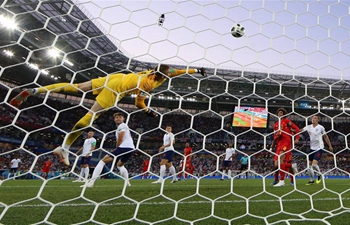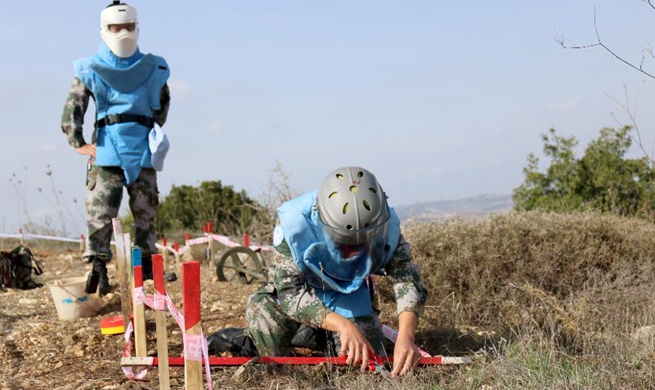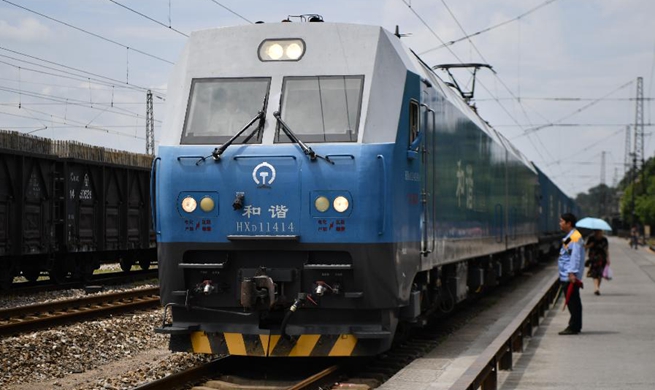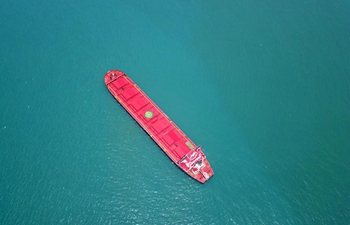ISTANBUL, June 29 (Xinhua) -- Amid the increasing U.S. threat of sanctions aimed at forcing Turkey to drop plans to buy Russia's sophisticated S-400 air defense system, analysts are divided over whether Ankara, which has so far resisted the pressure, will back out of the deal.
"The threats have no chance of pushing Ankara to back out," Huseyin Bagci, a professor of international relations in the Middle East Technical University, told Xinhua.
Wess Mitchell, U.S. Assistant Secretary of State for European and Eurasian Affairs, said on Tuesday that Ankara's acquisition of the missile system would negatively affect the military-industrial cooperation with Washington including the deal of brand new F-35 fighter jets.
Ankara finalized the S-400 anti-ballistic missile deal with Moscow last December, following more than a year of negotiations.
Despite warnings from the U.S. and NATO, top Turkish officials have repeatedly vowed that Ankara would not back out of the deal.
The issue is over and done with, President Recep Tayyip Erdogan said in April.
Bagci feels Ankara cannot be expected to give up buying the air defense system as it has painstakingly restored good ties with Moscow after downing a Russian jet near the Syrian border in 2015.
Noting that Ankara turned to Moscow after Washington had refused to provide it with a similar air defense system, he said, "Turkey needs such an air defense system due to security concerns."
Currently, Turkey has no modern long-range air defense system.
Transfer of technology and domestic production is a must for Ankara which complains that its NATO allies have failed to fulfill such criteria.
However, Mitchell of the U.S. State Department stated Washington's intention to block the delivery of the F-35 stealth jets to Turkey in case Ankara deploys the S-400 system on its soil.
One of the first two F-35 fighter jets for which Turkey has already paid was delivered last week to Turkish pilots in the U.S. for training purposes.
The F-35 jets are scheduled to arrive in Turkey in 2020.
Ankara and Moscow agreed in April to bring forward the delivery of the S-400 missiles and Turkey will get its first S-400 system in July next year.
In his testimony to the senate committee, Mitchell sent his warning about the S-400 deal between Russia and Turkey.
"A decision on S-400 will qualitatively change the U.S.-Turkish relationship in a way that would be very difficult to repair," he said.
Imposing sanctions on Turkey and blocking the delivery of the F-35 jets, which would be a violation of international law, would harm U.S. interests more as Ankara would then retaliate, maintained Bagci.
"The U.S. can't afford to lose Turkey when the issue is evaluated from a global and regional perspective," he said, advising the U.S. to carefully go over the Truman doctrine.
"The two countries which the U.S. should not lose in this region are Turkey and Israel," Bagci added.
NATO and the United States flatly reject the integration of a Russian air defense unit to the NATO's radar system. In response, Turkey said the Russian system would not be incorporated into the NATO system.
The United States is particularly concerned that the deployment of S-400 systems in Turkey would allow Russia to gather vital intelligence on F-35s in Turkey, which would also compromise the F-35 fleets other NATO members would buy.
In response, Ibrahim Kalin, Turkey's presidential spokesman, said on Thursday that Ankara would not back out of the S-400 deal even if it were to face U.S. sanctions.
The U.S. Congress recently passed a bill that called for a suspension of arms sales to Turkey, including F-35 and some other sophisticated weaponry such as the Patriot air defense system.
Turkey is not without options even if the United States halts sales of weapons, Kalin warned in an interview with the Bloomberg TV channel.
However, Cahit Armagan Dilek, head of the Ankara-based 21st Century Turkey Institute, does not believe it is much likely for Turkey to buy the Russian missiles.
He said President Erdogan is using the S-400 issue as a tool against the West to obtain their political and economic support by creating the impression that Turkey is getting away from the West.
Amid strained ties with the United States and the EU in recent years, Turkey has built close ties with Russia. There has been much talk of shift of axis in Turkish foreign policy in favor of Eurasian powers.
It's obvious that a single S-400 system would not meet Turkey's long-range air defense needs, Dilek, also a former staff officer in the Turkish military, told Xinhua.
Arguing that the S-400 is not a vital need for Turkey, he feels Turkey may well give up on it when confronted by pressing economic and military needs to turn to the West.
Ankara will acquire two S-400 systems, one of which will be optional, for 2.5 billion U.S. dollars. Each system is composed of two batteries. Turkey already made an advance payment for the missiles to Moscow last year.
Turkey's ailing economy's huge need for foreign capital and a substantial fine the United States is expected to impose on Halkbank, a state-owned Turkish bank, for having allegedly violated U.S. sanctions against Iran, are Ankara's weak spots, which could break its resistance against the U.S., remarked Dilek.
Noting that it will be the West to which Ankara will turn for loans to run its debt-stricken economy, he said the West would then demand Ankara limit its military ties with Russia.
It is widely argued that the Turkish economy, which suffers from a chronic high inflation and unemployment as the lira plummeted in recent months, is on the verge of an economic crisis.
Turkey is one of the partner countries in the production of F-35 jets and is planning to buy a total of 100 F-35 jets.

















